Filter by
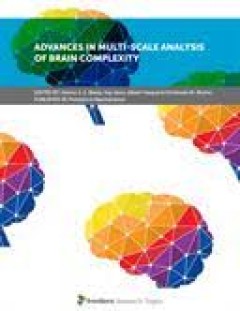
Advances in Multi-Scale Analysis of Brain Complexity
In neuroscience, a defining but elusive question regarding the human brain is its astonishingly structural and functional complexity. This complexity arises from the interaction of numerous neuronal circuits that operate over a wide range of temporal and spatial scales, enabling the brain to adapt to the constantly changing environment and to perform various high-level mental functions. Suc…
- Edition
- -
- ISBN/ISSN
- 9782889637706
- Collation
- 144
- Series Title
- -
- Call Number
- -

Complexity and Simplicity
This book is the outcome of an original and interdisciplinary undertaking by the Academy of Young Scholars and Artists based in Wrocław, Poland. One of the fundamental objectives of the Academy is to improve and foster communication between outstanding representatives of various fields of science, the humanities and art. In this regard to close the gap between the sciences, humanities and the …
- Edition
- -
- ISBN/ISSN
- 978-90-04-71453-3
- Collation
- oer.unej.ac.id
- Series Title
- Transdisciplinary Studies, Volume: 7
- Call Number
- -
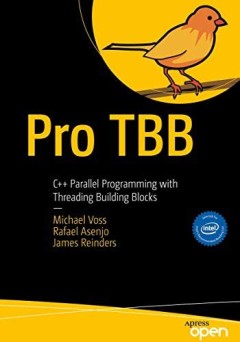
Pro TBB = C++ Parallel Programming with Threading Building Blocks
This open access book is a modern guide for all C++ programmers to learn Threading Building Blocks (TBB). Written by TBB and parallel programming experts, this book reflects their collective decades of experience in developing and teaching parallel programming with TBB, offering their insights in an approachable manner. Throughout the book the authors present numerous examples and best practice…
- Edition
- 1
- ISBN/ISSN
- 9781484243985
- Collation
- LXVI, 754 hlm; ill., lamp.,
- Series Title
- -
- Call Number
- -

Complexity and Simplicity
This book is the outcome of an original and interdisciplinary undertaking by the Academy of Young Scholars and Artists based in Wrocław, Poland. One of the fundamental objectives of the Academy is to improve and foster communication between outstanding representatives of various fields of science, the humanities and art. In this regard to close the gap between the sciences, humanities and the …
- Edition
- -
- ISBN/ISSN
- 978-90-04-71453-3
- Collation
- -
- Series Title
- Transdisciplinary Studies, Volume: 7
- Call Number
- -

Weakly Nonlinear Systems: With Applications in Communications Systems
The open access book covers a large class of nonlinear systems with many practical engineering applications. The approach is based on the extension of linear systems theory using the Volterra series. In contrast to the few existing treatments, our approach highlights the algebraic structure underlying such systems and is based on Schwartz’s distributions (rather than functions). The use of di…
- Edition
- -
- ISBN/ISSN
- 978-3-031-40681-2
- Collation
- XIV, 371
- Series Title
- -
- Call Number
- -
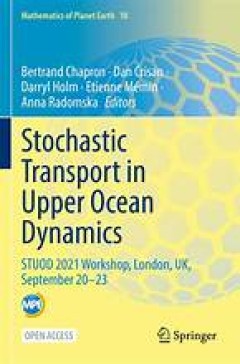
Stochastic Transport in Upper Ocean Dynamics III
This open-access proceedings volume brings selected, peer-reviewed contributions presented at the Fourth Stochastic Transport in Upper Ocean Dynamics (STUOD) 2023 Workshop, held at IFREMER in Plouzané, France, September 25–28, 2023. The STUOD project is supported by an ERC Synergy Grant, and led by Imperial College London, the National Institute for Research in Computer Science and Automatic…
- Edition
- 1
- ISBN/ISSN
- 978-3-031-70660-8
- Collation
- -
- Series Title
- Mathematics of Planet Earth
- Call Number
- XIV, 345
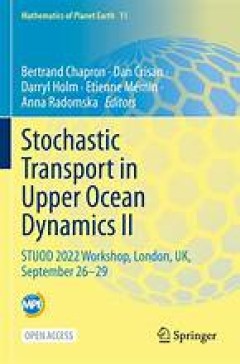
Stochastic Transport in Upper Ocean Dynamics
This open access proceedings volume brings selected, peer-reviewed contributions presented at the Stochastic Transport in Upper Ocean Dynamics (STUOD) 2021 Workshop, held virtually and in person at the Imperial College London, UK, September 20–23, 2021. The STUOD project is supported by an ERC Synergy Grant, and led by Imperial College London, the National Institute for Research in Computer S…
- Edition
- 1
- ISBN/ISSN
- 978-3-031-18988-3
- Collation
- -
- Series Title
- Mathematics of Planet Earth
- Call Number
- XVI, 317
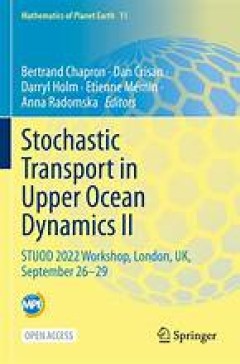
Stochastic Transport in Upper Ocean Dynamics II
This open access proceedings volume brings selected, peer-reviewed contributions presented at the Third Stochastic Transport in Upper Ocean Dynamics (STUOD) 2022 Workshop, held virtually and in person at the Imperial College London, UK, September 26–29, 2022. The STUOD project is supported by an ERC Synergy Grant, and led by Imperial College London, the National Institute for Research in Comp…
- Edition
- 1
- ISBN/ISSN
- 978-3-031-40094-0
- Collation
- -
- Series Title
- Springer Cham
- Call Number
- XIV, 338

Stochastic Transport in Upper Ocean Dynamics
This open access proceedings volume brings selected, peer-reviewed contributions presented at the Stochastic Transport in Upper Ocean Dynamics (STUOD) 2021 Workshop, held virtually and in person at the Imperial College London, UK, September 20–23, 2021. The STUOD project is supported by an ERC Synergy Grant, and led by Imperial College London, the National Institute for Research in Computer S…
- Edition
- 1
- ISBN/ISSN
- -
- Collation
- -
- Series Title
- Mathematics of Planet Earth
- Call Number
- XVI, 317

Stochastic Transport in Upper Ocean Dynamics II
This open access proceedings volume brings selected, peer-reviewed contributions presented at the Third Stochastic Transport in Upper Ocean Dynamics (STUOD) 2022 Workshop, held virtually and in person at the Imperial College London, UK, September 26–29, 2022. The STUOD project is supported by an ERC Synergy Grant, and led by Imperial College London, the National Institute for Research in Comp…
- Edition
- -
- ISBN/ISSN
- 978-3-031-40093-3
- Collation
- XIV, 338
- Series Title
- -
- Call Number
- -
 Computer Science, Information & General Works
Computer Science, Information & General Works  Philosophy & Psychology
Philosophy & Psychology  Religion
Religion  Social Sciences
Social Sciences  Language
Language  Pure Science
Pure Science  Applied Sciences
Applied Sciences  Art & Recreation
Art & Recreation  Literature
Literature  History & Geography
History & Geography